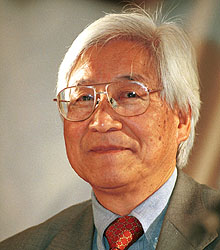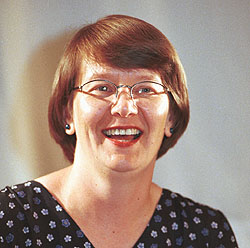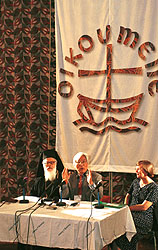Koyama, the author of Waterbuffalo Theology and a former professor at Union Theological Seminary in New York City, led assembly participants in reflecting on the theme "Rejoice in Hope". He opened with a sobering litany of the world's afflictions: poverty, ethnic conflict, the nuclear threat, "starving children, people uprooted from their homes", the ecological crisis. Concern about how churches can respond to these problems resurfaced in subsequent discussions throughout the assembly. "In a world so shattered and broken by violence...," Koyama asked, "how can we rejoice in hope?"
We have hope, he continued, because we believe in a "compassionate God", who runs out from the centre to meet those on the periphery of life. Our task is to make God's love visible to the world by loving our neighbours. "The rejoicing of a private and exclusive community fails to invite all to hope," Koyama declared. We must be willing to give and receive from strangers as well as from our brothers and sisters, because "for God no one is a stranger".
Koyama's speech, which was interrupted several times by enthusiastic applause, followed thoughtful addresses by Archbishop Anastasios of Tirana and All Albania and Brazilian theologian Wanda Deifelt on other aspects of the assembly theme. Anastasios, primate of the Orthodox Autocephalic Church in Albania, spoke about anamnesis, which means "remembrance". He described the church as a community defined by its memory -- of its history and tradition, and of God's redemptive and transforming work through Christ on its behalf. Anamnesis is not just an intellectual function, but "an incessant dynamic turning to the Triune God, the source of being..." It can be experienced in an African hut or in a magnificent cathedral -- wherever Christ is present.
Deifelt, vice-rector and professor of systematic theology at Lutheran Theological Seminary in Sao Leopoldo, Brazil, unpacked the meaning of another Greek word, metanoia, which means "conversion". True conversion, she said, means "changing direction and starting anew". This requires repenting for the limited ways we perceive God (treating God as our "personal employee"), and for the way we perceive our fellow human beings (not recognizing God's image in them). "All human beings reflect the divine image, independent of class, race, caste, gender, age or sexual preference," she declared.
Even nature, she added, reflects something of the divine and needs our care. "We see the world through our tears," sharing its suffering as we proclaim our hope in God's promise of resurrection. "Nothing can be more radical," she concluded, than "standing at the foot of the cross" and saying "I believe in Christ."

Dr Kosuke Koyama
Photo by Chris Black/WCC
Prof. Wanda Deifelt
Photo by Chris Black/WCC
The three plenary speakers
Photo by Chris Black/WCC
Click on the photo to order (ref. 7076-07)

Click on the photo to order (ref. 7076-15)

Click on the photo to order (ref. 7016-26)
